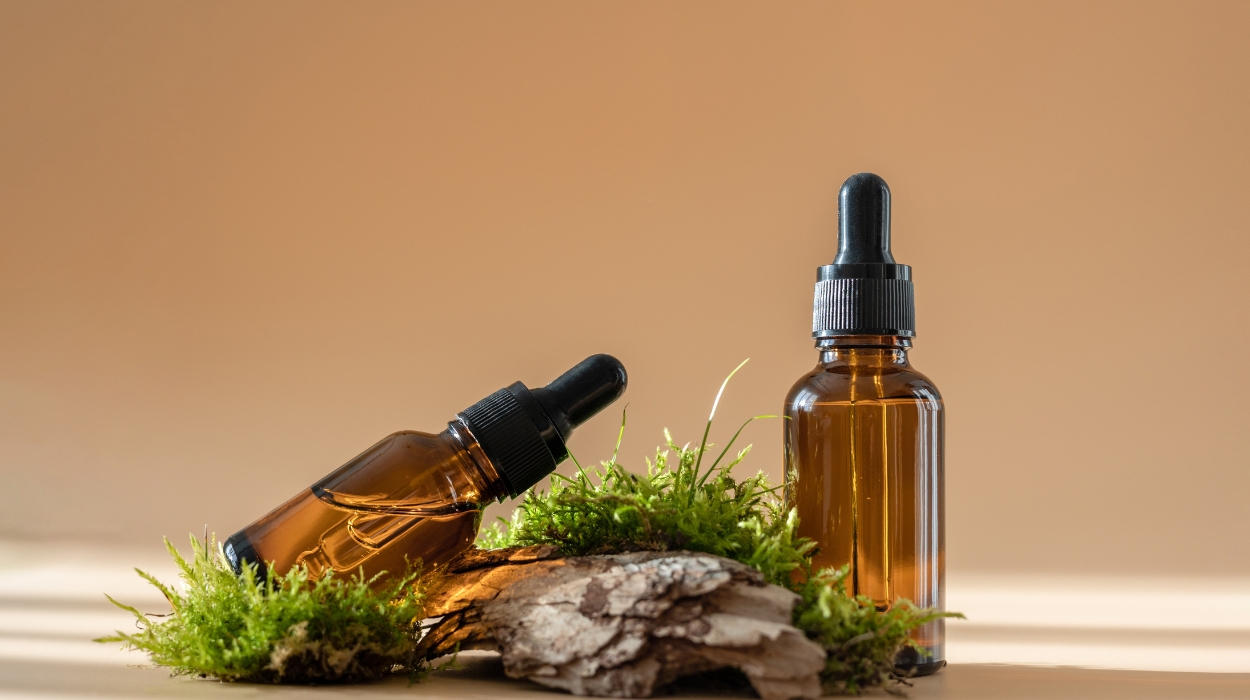 Expert's opinion
Expert's opinion
Expert's opinion
The article is a subjective view on this topic written by writers specializing in medical writing.
It may reflect on a personal journey surrounding struggles with an illness or medical condition, involve product comparisons, diet considerations, or other health-related opinions.
Although the view is entirely that of the writer, it is based on academic experiences and scientific research they have conducted; it is fact-checked by a team of degreed medical experts, and validated by sources attached to the article.
The numbers in parenthesis (1,2,3) will take you to clickable links to related scientific papers.
Tea Tree Oil For Hair: Benefits & How To Use It Effectively 2024

Essential oils can provide many benefits. One particularly versatile oil is tea tree oil, and one of its touted benefits is helping hair growth. This oil is used across many industries, including the health and beauty industry.
Products with tea tree oil for hair are abundant. While there are many tips for how to stimulate hair growth, tea tree oil for hair growth may be a potential treatment.
Keep reading and find up-to-date information on tea tree oil and the answer to the question, does tea tree oil help hair growth?
Does Tea Tree Oil Help Hair Growth?
- Tea tree oil is not an approved treatment for hair loss.
- Tea tree oil may promote hair growth as a supplementary treatment.
- The benefits of tea tree oil include antifungal and anti-inflammatory properties.
- Has the potential to be used as a supplementary treatment for dandruff and head lice.
What Is Tea Tree Oil For Hair?

Tea tree oil[1] is an essential oil derived from plants that are part of the Myrtaceae family, which is Indigenous to Australia. This natural oil is known for providing antioxidant and antimicrobial properties against bacteria and fungal infections.
Historically, tea tree oil was used as an insect repellent and general anti-microbial agent in World War II. It is now used as a preservative, fungicide, and natural biocide and is found in many cosmetics, herbal medicines, and aromatherapy.
There has even been a recent exploration into using tea tree oil as a natural microbicide in the food and agriculture industry.
While this essential oil is clearly versatile, what are the tea tree oil benefits for hair? Does tea tree oil help with hair growth?
Tea Tree Oil Benefits For Hair

A lot goes into keeping our scalp and hair healthy. Numerous factors, such as the nutrients we consume, the environment we are exposed to, and the hair tools and products we choose to use all influence our hair health.
It can be difficult to navigate which product for hair is the one you need. Below are the many tea tree oils for natural hair and scalp benefits.
Tea Tree Oil For Hair Loss
Is tea tree oil good for hair growth? A recent 2021 review[2] investigated the efficacy of using essential oils to treat androgenetic alopecia, which is the medical term for male and female pattern baldness.
The review included findings from a randomized control trial in 2013[3] which found individuals with hair loss receiving minoxidil, diclofenac, and tea tree oil instead of just minoxidil or the placebo had an earlier response to the hair loss treatment.
The review determined that hair oils are likely best used as complementary supplements to prescriptions or conventional treatments. This is because while most essential hair oils are well tolerated, limited studies prove the efficacy of these essential oils on their own.
There are many hair products on the market that claim to promote hair growth. Currently, only oral finasteride, topical minoxidil, and low-level laser therapy are approved for hair loss treatment by the Food and Drug Act.
Scalp Health
A 2015 review[4] summarized research on dandruff and seborrheic dermatitis, a skin condition characterized by scaly skin patches, inflamed skin, and stubborn dandruff. Both conditions involve an itchy, flaky scalp.
The review stated the most common treatments for these conditions are topical antifungal and anti-inflammatory properties. Tea tree oil was noted as an alternative therapy, as studies have suggested this essential oil could be used as a treatment for seborrheic dermatitis.
While it is possible to see results after using tea tree oil for hair dandruff that could reduce itchy scalp and scalp inflammation, more research is needed to determine the true efficacy.
Lice
A 2022 systematic review[5] investigated the antiparasitic activity of tea tree oil. The findings demonstrated that tea tree oil and its components could potentially treat several parasitic infections, including those caused by lice.
Due to the antibacterial and anti-inflammatory of tea tree oil, and its ability to kill head lice and lice eggs, the review also stated it could be a headlice treatment if part of a pharmacological formulation.
Ingrown Hairs
Is tea tree oil for ingrown hair? Ingrown hairs occur when hair grows into the skin instead of outward past the skin’s surface. While there are many articles online stating tea tree oil can prevent and treat ingrown hairs, there is no scientific research to back up those claims.
What tea tree oil has been shown to do is enhance healing. This is due to its antibacterial, antifungal, and antioxidant activities that reduce inflammation. So, tea tree oil may have the potential to promote the healing of ingrown hair lesions.
Side Effects
While there are many benefits to using tea tree oil, what are the risks?
Tea tree oil[6] has traditionally been used as an antiseptic and herbal medicine by the Indigenous people of Australia. Today tea tree oil is used for many ailments, including acne, athlete’s foot, lice, fungal infections, mite infections, and insect bites.
However, the National Center for Complementary and Integrative Health reports only small amounts of research with human trials have been completed on the topical use of tea tree oil. Thus there is not enough evidence to make solid conclusions.
This does not mean tea tree oil products must be avoided. However, you should always exercise caution when trying a new product. Some factors to consider before trying a new tea tree oil product are listed below.
Do Not Swallow
Tea tree oil is not digestible and should not be swallowed. Swallowing tea tree oil has been shown to cause confusion, loss of muscle coordination, breathing problems, and coma. Tea tree oil products should not be ingested and should be out of reach of children.
Contact Dermatitis
As with any skincare or hair care product; there is the risk of having contact dermatitis, which is allergic skin irritation. If you obtain contact dermatitis from a hair product, you may have an itchy scalp. Individuals with sensitive skin may be more prone to contact dermatitis.
To reduce your risk of having a bad reaction, always be sure to do a skin patch test when trying out a new product. Simply put a small amount of product on a small patch of skin where the product is not likely to be rubbed or washed off, for example, your arm, and wait 24 hours.
If you have particularly sensitive skin, you may want to wait a couple of days after you do the skin patch test to see if irritation occurs.
Pregnancy/Breastfeeding
There is not much known about the use of tea tree oil during pregnancy and while breastfeeding. If you have questions about using tea tree oil during pregnancy or while breastfeeding, it is best to contact your primary healthcare provider.
How To Use Tea Tree Oil For Hair Growth
As mentioned earlier in this article, the only hair products that are approved for hair loss by the Food and Drug Act are oral finasteride, topical minoxidil, and low-level laser therapy. It would be best to therefore use tea tree oil as a supplementary treatment.
Many tea tree essential oils for hair products exist, including pure and organic tea tree oil. The instructions for using tea tree oil as a supplementary treatment for hair growth will vary by product.
Some products are ready to use, so adding it directly to your hair is an option. Other products will require you to dilute tea tree oil with a carrier oil, such as coconut oil or jojoba oil.
It is important to always follow the instructions on the product you purchase. Typically, products will instruct you to apply ready-to-use tea tree oil for hair or diluted tea tree oil directly onto your oily scalp, massage it in, and leave it on anywhere from 5 minutes to overnight.
What Does Tea Tree Oil Do For Hair?
Some additional tea tree oil products for hair and their benefits are listed below.
- Add a few drops of diluted tea tree oil to dry or damp hair to reduce frizz and promote shine.
- Use a tea tree oil-infused hair mask to promote hydration.
- Use tea tree oil shampoo formulated to treat dandruff to promote a healthier scalp.
- Apply tea tree oil conditioner to wet hair after shampooing to lock in moisture and enhance shine.
Conclusion
Overall, tea tree oil is good for hair. While there still needs to be more research done to determine its effectiveness of as a treatment for fungal and bacterial infections, acne, and bug bites, there is no indication at this time that it is bad for hair.
Further, most research to date is promising, indicating a tea tree oil has the potential to promote growing hair, treat head lice, promote a healthy scalp, and result in healthier hair.
+ 6 sources
Health Canal avoids using tertiary references. We have strict sourcing guidelines and rely on peer-reviewed studies, academic researches from medical associations and institutions. To ensure the accuracy of articles in Health Canal, you can read more about the editorial process here
- Yasin, M., Younis, A., Javed, T., Akram, A., Ahsan, M., Shabbir, R., Muhammad Moaaz Ali, Tahir, A., El-Ballat, E.M., Sheteiwy, M.S., Sammour, R.H., Hano, C., Alhumaydhi, F.A. and El‐Esawi, M.A. (2021). River Tea Tree Oil: Composition, Antimicrobial and Antioxidant Activities, and Potential Applications in Agriculture. Plants, [online] 10(10), pp.2105–2105. doi:https://doi.org/10.3390/plants10102105.
- Nestor, M.S., Ablon, G., Gade, A., Han, H. and Fischer, D.L. (2021). Treatment options for androgenetic alopecia: Efficacy, side effects, compliance, financial considerations, and ethics. Journal of Cosmetic Dermatology, [online] 20(12), pp.3759–3781. doi:https://doi.org/10.1111/jocd.14537.
- Sakr, F.M., Gado, A.M., Mohammed, H.R. and Adam (2013). Preparation and evaluation of a multimodal minoxidil microemulsion versus minoxidil alone in the treatment of androgenic alopecia of mixed etiology: a pilot study. Drug Design Development and Therapy, [online] pp.413–413. doi:https://doi.org/10.2147/dddt.s43481.
- Borda, L.J. and Wikramanayake, T.C. (2015). Seborrheic Dermatitis and Dandruff: A Comprehensive Review. Journal of clinical and investigative dermatology, [online] 3(2). doi:https://doi.org/10.13188/2373-1044.1000019.
- Abrha, S., Tesfaye, W., Christenson, J.K., Carson, C. and Thomas, J. (2022). Antiparasitic Activity of Tea Tree Oil (TTO) and Its Components against Medically Important Ectoparasites: A Systematic Review. Pharmaceutics, [online] 14(8), pp.1587–1587. doi:https://doi.org/10.3390/pharmaceutics14081587.
- NCCIH. (2015). Tea Tree Oil. [online] Available at: https://www.nccih.nih.gov/health/tea-tree-oil.

